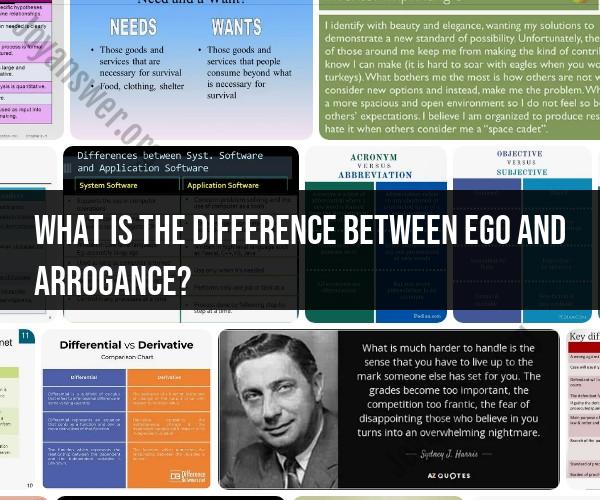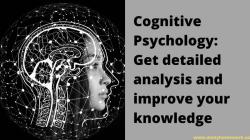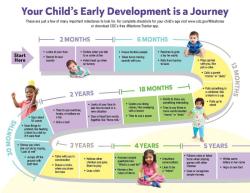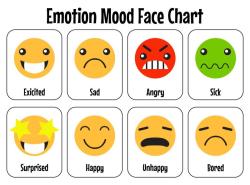What is the difference between ego and arrogance?
Ego and arrogance are related concepts, but they have distinct meanings and characteristics. Understanding the difference between ego and arrogance is important in discussions about self-esteem, personality, and behavior:
Ego:
- Self-Identity: Ego refers to one's sense of self-identity, self-worth, and self-esteem. It is a fundamental aspect of human psychology and is necessary for a healthy sense of self.
- Balanced Confidence: Ego, in a healthy form, involves having self-confidence, self-respect, and a positive self-image. It means recognizing your own worth and abilities without belittling others.
- Self-Awareness: A healthy ego is characterized by self-awareness, a realistic view of one's strengths and weaknesses, and a willingness to learn and grow.
- Motivation: Ego can be a positive motivator, driving individuals to achieve their goals and overcome challenges.
- Empathy: People with a healthy ego can also be empathetic and considerate of others' feelings and perspectives.
Arrogance:
- Exaggerated Self-Importance: Arrogance, on the other hand, involves an exaggerated sense of self-importance and superiority. Arrogant individuals often believe they are better than others in various ways.
- Disregard for Others: Arrogance is often accompanied by a lack of respect or consideration for the feelings and perspectives of others. Arrogant people may dismiss or belittle those they see as inferior.
- Inflexibility: Arrogance is associated with inflexibility and a reluctance to acknowledge one's own limitations or mistakes.
- Defensiveness: Arrogant individuals are often defensive and may react strongly to any perceived challenges to their self-image.
- Negative Impact on Relationships: Arrogance can strain relationships and lead to conflict and alienation from others.
In summary, ego is a fundamental aspect of one's self-esteem and self-identity, and a healthy ego is characterized by self-confidence, self-awareness, and empathy. On the other hand, arrogance involves an exaggerated sense of self-importance, a lack of empathy, and a negative impact on relationships. The key distinction is that ego, in a balanced form, is a natural and healthy aspect of human psychology, while arrogance represents an unhealthy and exaggerated form of self-importance.
Ego vs. Arrogance: Distinguishing Traits and Characteristics
Ego and arrogance are often confused, but there are some key differences between the two. Ego is a sense of self-importance, while arrogance is a feeling of superiority over others.
People with a healthy ego are confident in their abilities and accomplishments, but they are also humble and open to feedback. Arrogant people, on the other hand, have an inflated sense of their own importance and believe that they are better than others.
Here is a table that summarizes the key differences between ego and arrogance:
| Trait | Ego | Arrogance |
|---|---|---|
| Sense of self | Healthy self-importance | Inflated sense of superiority |
| Openness to feedback | Open to feedback | Closed to feedback |
| Attitude towards others | Humble | Dismissive and condescending |
Understanding the Psychological and Behavioral Aspects
Ego and arrogance can have a significant impact on our psychology and behavior. People with a healthy ego are more likely to be successful in their careers and relationships. They are also more likely to be happy and fulfilled.
Arrogant people, on the other hand, are more likely to experience problems in their careers and relationships. They are also more likely to be unhappy and unfulfilled.
Here are some of the psychological and behavioral aspects of ego and arrogance:
- Ego: People with a healthy ego are more likely to be motivated to achieve their goals. They are also more likely to be resilient in the face of setbacks.
- Arrogance: Arrogant people are more likely to be motivated by a need for power and control. They are also more likely to be defensive and hostile when they are criticized.
Recognizing Healthy Self-Esteem and Confidence
Healthy self-esteem and confidence are important for our mental and emotional well-being. People with healthy self-esteem and confidence believe in their abilities and value themselves as individuals.
Here are some of the signs of healthy self-esteem and confidence:
- Feeling comfortable in your own skin
- Being able to accept compliments
- Being able to admit when you're wrong
- Being able to handle criticism without becoming defensive
- Setting realistic goals and expectations for yourself
The Impact of Ego and Arrogance on Relationships
Ego and arrogance can have a negative impact on our relationships. People with a healthy ego are more likely to be empathetic and understanding of others. They are also more likely to be willing to compromise and work through problems.
Arrogant people, on the other hand, are more likely to be selfish and demanding. They are also more likely to be dismissive of others and their feelings.
Here are some of the ways that ego and arrogance can impact relationships:
- Ego: People with a healthy ego are more likely to be able to maintain healthy relationships. They are also more likely to be able to resolve conflict in a constructive way.
- Arrogance: Arrogance can lead to a number of problems in relationships, such as communication problems, conflict, and resentment.
Developing Self-Awareness and Emotional Intelligence
Self-awareness and emotional intelligence are two key factors in developing a healthy ego and avoiding arrogance. Self-awareness is the ability to understand your own thoughts, feelings, and motivations. Emotional intelligence is the ability to manage your own emotions and build strong relationships with others.
Here are some tips for developing self-awareness and emotional intelligence:
- Pay attention to your thoughts and feelings. What are you thinking and feeling in different situations? Why are you thinking and feeling that way?
- Reflect on your behavior. What are your usual patterns of behavior? How do your actions affect others?
- Seek feedback from others. Ask trusted friends and family members for honest feedback on your strengths and weaknesses.
- Be open to learning and growing. Everyone makes mistakes. Be willing to learn from your mistakes and grow as a person.
By developing self-awareness and emotional intelligence, you can develop a healthy ego and avoid the negative consequences of arrogance.












